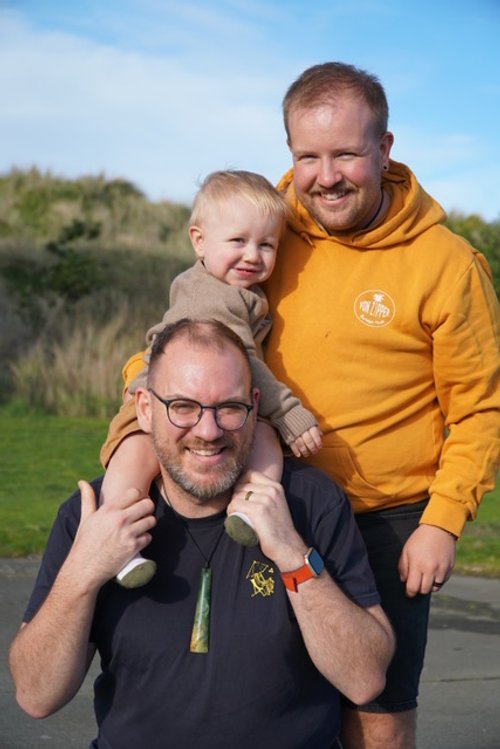Frankie and Rāwā.
Frankie and Rāwā Karetai Wood-Bodley
by Ila Couch
A warm winter sun spills into the toy-filled living room of Rāwā (Kāi Tahu) and Frankie Karetai Wood-Bodley’s rural Canterbury home. It’s been a busy week for the couple, with friends and whānau in town to celebrate the first birthday of their tamaiti Hiwa-i-te-Rangi. Named after the wishing star in the Matariki cluster, Hiwa is a bubbly, talkative pēpi, and a dream come true for Frankie and Rāwā.
Before meeting each other the queer-identifying couple had almost given up on the idea of having children. Frankie, a non-binary trans gay man, even had a checklist for prospective partners. “I was tired of meeting unsuitable people, says Frankie. If they didn’t want to be married, monogamous, and have children, I wasn’t interested.”
Both passionate human rights defenders, Frankie and Rāwā first met over coffee in June 2019 while Frankie was in Ōtautahi for work. They ended up working together as part of the Covid-19 Disability Response Team and then, three months after Frankie’s contract was finished, the pair began making good on Frankie’s checklist.
Even before their April 2021 wedding, the couple began preparing to start a family. Frankie stopped taking testosterone, a process that Rāwā says aligned with their journey of decolonisation around birthing practices.
“We talked about the connection with iwi and hapū and if we were to have children, for our child to have that,” says Rāwā. Connecting to my whakapapa was important but also connecting around our shared values, and the ways those values transcend culture was important too.”
Frankie grew up in Whanganui after immigrating to Aotearoa with their South African parents.
“When Hiwa was born, the umbilical cord was cut with pounamu and secured with a muka tie the couple made. The wahakura was used through infancy, and the waiata they learned before birth is one the whānau still sing today.
“Simple things like these were easy to incorporate,” says Rāwā. The science behind the wahakura was relevant. There needs to be airflow around the baby and the dried flax provides that. The waiata leads into the early developmental stage for the baby’s growth and kōhanga. The great thing about the work Kelly is doing is that it takes these tupuna practices and revives them but also grounds them in a modern context which is something people get behind.”
One of the benefits of having the support of the Māori midwife network came just after Hiwa was born.
“We were fortunate to get whānau to whānau milk donation,” says Rāwā. Whānau have been donating to whānau for centuries. I’m not sure we would have got that through the public health system. The midwives hooked us up.”
The joy of becoming parents was not without its losses. Rāwā reflects on a lack of understanding of how best to navigate the experience of miscarriage.
“We had a couple of miscarriages and as much as they are common, it still took a toll. Everybody talks about the joy of the baby but they don’t talk about how grueling it can be. I just wish we had known more about Te Ao Māori perspective and the grieving process.”In the advocacy mahi they do through their agency Frankie and Rāwā work to advance the rights of Disability and LGBTIQA+/Rainbow Communities generally, and in particular in accessing conception and birthing services. Rāwā says an interview on Queer and Here led to the couple taking part in a documentary about their pregnancy journey.
“Telling the story of a trans person who is pregnant and navigating society is not what you hear every day. Most clinicians have not come across working with a trans person who can naturally carry. We had a mishap with a clinic quite early in the misgendering of Frankie. There’s a whole lot of those things that went on and carried on even after Frankie gave birth. That was a big motivator for why we wanted to tell our story.”
Photo credit: Ila Couch, 2024.


